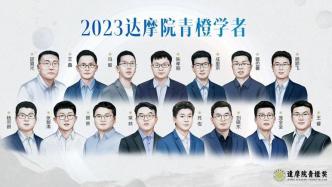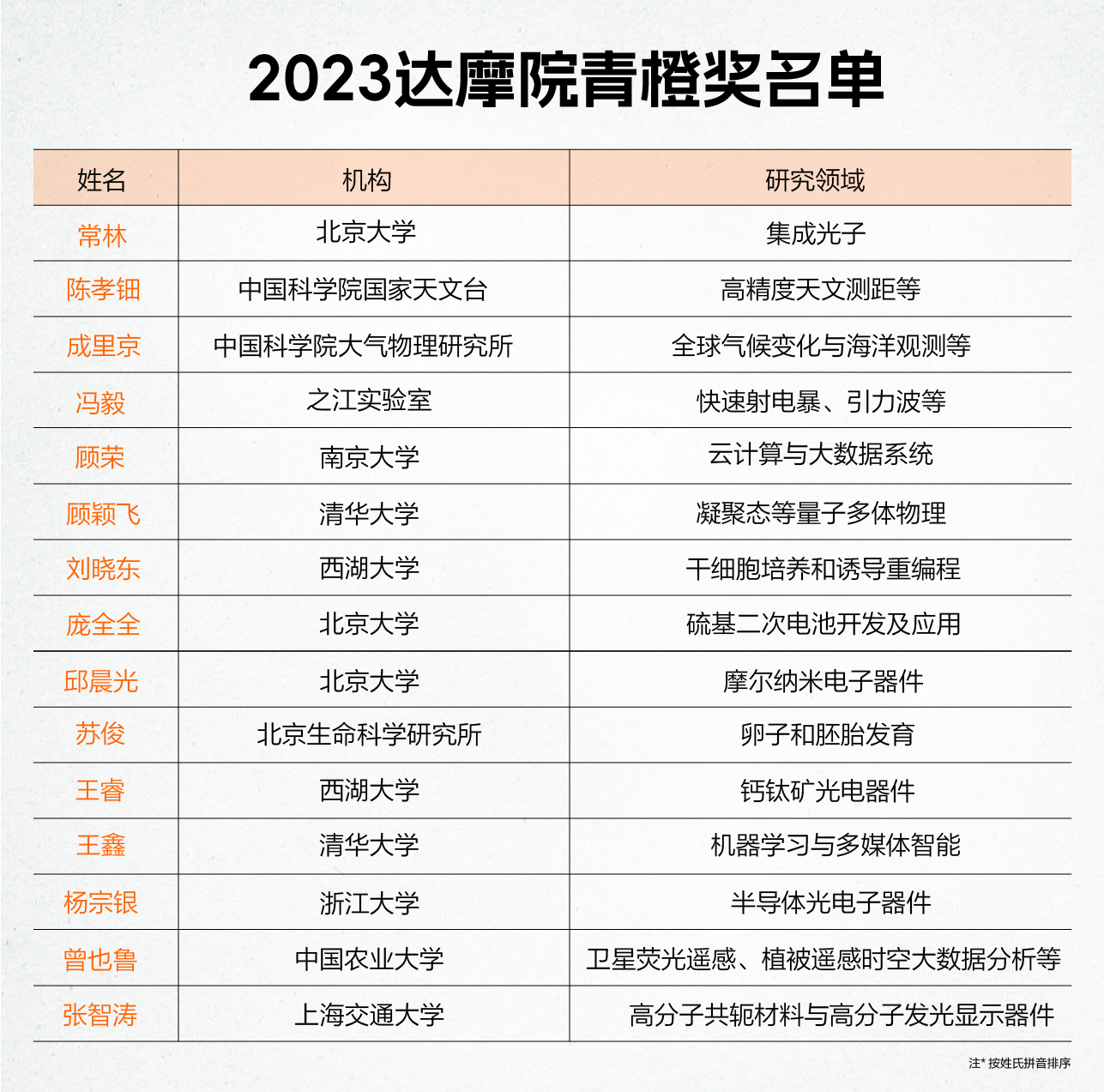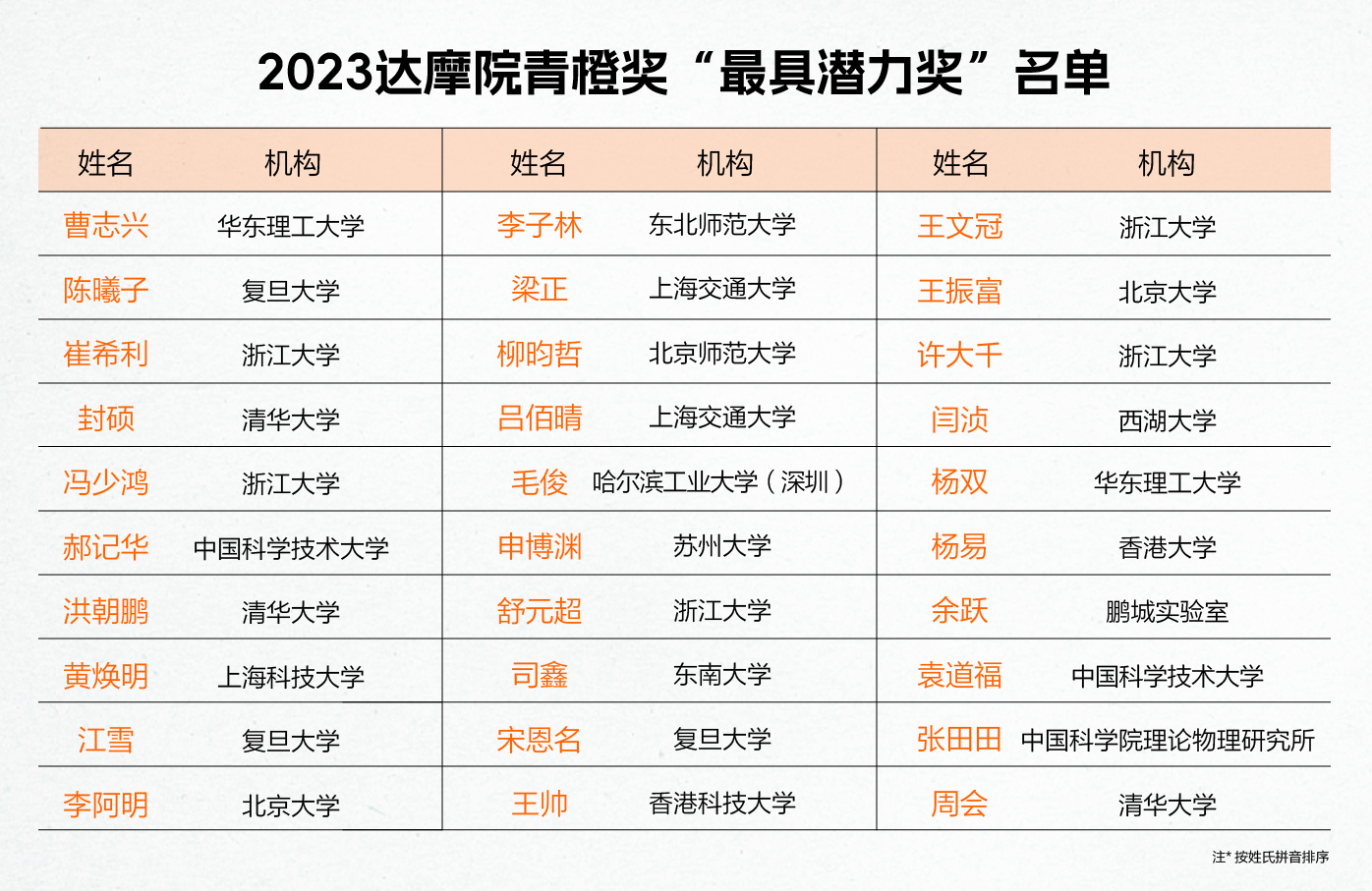

15 people have won the Green Orange Award, 9 of whom are from relevant scientific research institutes in Beijing. Each winner will receive a discretionary bonus of RMB 1 million.
On December 27, the 2023 Alibaba Damo Academy Green Orange Award list and the "Most Potential Award" list were announced.
15 people won the Green Orange Award, and each winner received a discretionary bonus of 1 million yuan.
30 people won the "Most Potential Award" of the Green Orange Award, and each winner received a discretionary bonus of RMB 100,000.
ThePaper Technology noticed that 9 of the 15 Green Orange Award winners are from relevant scientific research institutes in Beijing , 4 are from Zhejiang Province, 1 is from Shanghai, and 1 is from Nanjing, Jiangsu Province. Among them, Peking University has the largest number of Green Orange Award winners , a total of three , namely: Chang Lin, a researcher at the School of Electronics, Peking University, Qiu Chenguang, a researcher at the Carbon Center of Peking University, and Pang Quanquan, an assistant professor at the School of Materials Science and Engineering, Peking University.

30 people won the "Most Potential Award" of the Green Orange Award, and each winner received a discretionary bonus of RMB 100,000.
Among the 30 Green Orange Award "Most Potential Award" winners, 8 are from Shanghai .
The Green Orange Award was established by Alibaba Group in 2018 to award young Chinese scholars who have played a key role in promoting scientific and technological progress.
Candidates for the Green Orange Award must be 35 years old or younger in the year of entry, engage in full-time scientific research in Chinese universities and research institutes, and have obtained a doctorate. The fields in which candidates can participate include mathematics and physics, chemistry and materials, life sciences and medicine, astronomy and earth sciences, information science and engineering, emerging interdisciplinary sciences, etc.
2023 Damo Academy Green Orange Award Winners and Reasons for Awarding:
Chang Lin (Researcher, School of Electronics, Peking University)
He has done a lot of internationally leading work in the field of silicon-based optoelectronics integration technology and developed a series of new application scenarios for integrated photonic chips.
Chen Xiaodan (Associate Researcher at the National Astronomical Observatory of the Chinese Academy of Sciences)
Established the largest celestial variable star database in China, created an intuitive three-dimensional map of the Milky Way for the first time, and promoted China's high-precision astronomical ranging research and the development of world-class optical astronomical observatories.
Cheng Lijing (researcher at the Institute of Atmospheric Physics, Chinese Academy of Sciences)
Its research results support my country's national needs to deal with climate and ocean changes and provide Chinese solutions for global ocean data processing.
Feng Yi (researcher at Zhijiang Laboratory)
The pioneering combination of China Sky Eye FAST and intelligent computing provides key clues to uncover the origin of fast radio bursts.
Gu Rong (distinguished researcher at the Department of Computer Science and Technology, Nanjing University)
Proposes a series of key technologies for cloud-native data elastic acceleration to effectively solve problems such as resource imbalance and inefficient operation of big data and cloud computing systems.
Gu Yingfei (researcher at Tsinghua University Institute for Advanced Study)
For the first time, the theoretical physics model SYK was extended to high dimensions, leading the development of this model in the fields of condensed matter physics and quantum many-body chaos.
Liu Xiaodong (Researcher, School of Life Sciences, West Lake University)
Its research on cell reprogramming technology provides solutions for a wide range of applications in the fields of cell therapy, organ tissue engineering and regenerative medicine based on pluripotent stem cells.
Pang Quanquan (Assistant Professor, School of Materials Science and Engineering, Peking University)
He was the first to propose a new low-cost, high-safety aluminum-sulfur battery system, which shows great application potential in wind and solar distribution and industrial energy storage and other fields.
Qiu Chenguang (researcher at Peking University Carbon Center)
Committed to developing new post-Moore electronic devices, achieving the highest room temperature ballistic rate of transistors to date, and pushing the performance of low-dimensional semiconductor devices close to the limits of quantum theory.
Su Jun (researcher at Beijing Institute of Life Sciences)
His research focuses on the molecular mechanism of spindle assembly in mammalian oocytes, which for the first time provides the possibility of preventing and treating chromosome number abnormalities in human eggs, and provides a solution for women to overcome infertility.
Wang Rui (Researcher, School of Engineering, West Lake University)
His research has greatly improved the efficiency and stability of perovskite solar cells, laying the foundation for promoting the industrial application of perovskite.
Wang Xin (Assistant Professor, Department of Computer Science, Tsinghua University)
He proposed multimedia machine learning theoretical methods, led the development of the world's first graph automatic machine learning framework, and promoted the in-depth exploration and application of this technology in academia and industry.
Yang Zongyin (Researcher of the Hundred Talents Program of the School of Information and Electronic Engineering, Zhejiang University)
It solves the problem of both small size and high performance of spectrometers, pioneers the field of spectrometer miniaturization, and opens up the potential for subsequent industrialization.
Zeng Yelu (Professor, College of Land Science and Technology, China Agricultural University)
Its quantitative remote sensing research based on vegetation fluorescence and radiative transfer models has greatly reduced the uncertainty of fluorescence satellite observations and made important contributions to research on carbon neutrality and food security.
Zhang Zhitao (Associate Professor, School of Chemistry and Chemical Engineering, Shanghai Jiao Tong University)
The first development of stretchable light-emitting diodes based on all-organic polymers promoted the development of new domestic flexible wearable electronic light-emitting materials in bioelectronic devices and medical fields.
